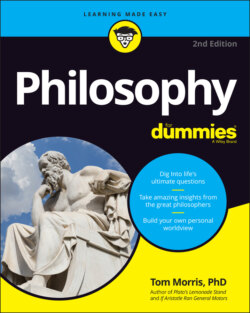Читать книгу Philosophy For Dummies - Tom Morris - Страница 18
Mapping Our Way Forward
ОглавлениеConsulting the great thinkers of the past, as we draw our own philosophical maps for the present and future, is like stopping to ask a local for directions, rather than just wandering around lost. It’s getting the advice of those who know, people who have been in the neighborhood before and can find their way around. We inevitably do a little exploring of your own, but any good advice and direction we get can help.
In any expedition into unfamiliar terrain, it pays to have a native guide to lead us, but ultimately we all have to pull ourselves up the side of the hill. We partner with the great thinkers who have gone before us and, with their help try to see our own vistas and make our own way.
The American philosopher Ralph Waldo Emerson once wrote these important words that fall short only in referring to just one gender:
Meek young men grow up in libraries, believing it their duties to accept the views which Cicero, which Locke, which Bacon, have given; forgetful that Cicero, Locke, and Bacon were only young men in libraries when they wrote these books.
“Who am I to think about these things?” each of us is tempted to ask. Well, who did Socrates think he was to be tackling such ideas? Who was Plato? In the first century, Seneca wrote,
Philosophy did not find Plato already a nobleman; it made him one.
It’s every bit as much our business to ask questions about the big issues as it was theirs. But because they already started the process, we can benefit from their thinking and enter a conversation that began long ago, perhaps to make our own useful contributions. As the ancient dramatist Menander claimed, “Whoever consorts with the wise will become wise.”
We consult the writings of the great dead philosophers not for any final word on the ultimate questions of philosophy, but rather to help get us started, using the insights and avoiding the pitfalls already discovered by those who have gone before us. Early in this century, William Ralph Inge explained, “The object of studying philosophy is to know one’s own mind, not other people’s.” So when we are doing philosophy, we go to the books and essays of past thinkers not to take inventory of their thoughts, or to gather up from them all the answers we might want, but, rather, for the assistance and inspiration we need to do our own jobs as thinkers.
Emerson comments, “Books are the best of things, well used; abused, among the worst. What is the right use? What is the one end which all means go to effect? They are for nothing but to inspire.” I hope in this book to begin to inspire you, as I have been inspired by the books of others, to look into these matters for yourself and fight to attain a bit of your own wisdom for life. Likewise, I’ll be your guide, as I use many guides myself, to make our way forward together.
